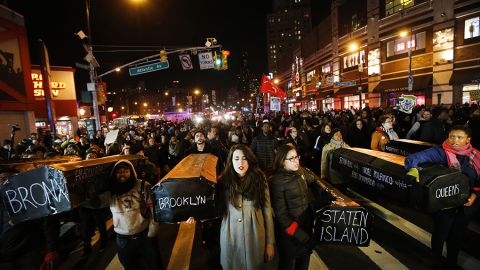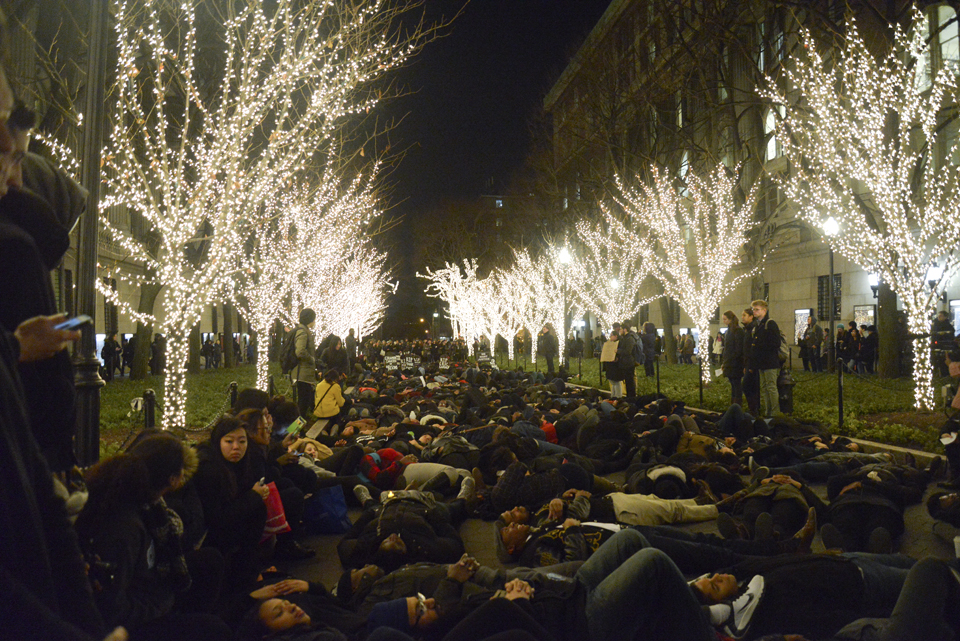By Cesay Camara
Eric Garner, an African-American
Garner’s encounter with the officers was all caught on more than 7-minutes of cellphone video footage by Garner’s friend- Ramsey Orta. During the encounter, Garner expressed his frustration with the officers and is heard on the video saying: “Every time you see me, you want to mess with me. I’m tired of it. Please just leave me alone. I told you the last time, please just leave me alone”.
Further into the footage, the officers try to arrest Garner and Officer Pantaleo grabs him from the back in what many consider a choke hold. Since Garner’s death, many have debated whether or not Pantaleo actually used a choke hold, and others have questioned whether the apparent choke hold was the primary cause of death given that he had other health complications such as asthma and heart disease. The Medical Examiner ruled Garner’s case a homicide primarily because of neck compressions from the choke hold and, as the ME’s report made clear: “prone positioning during physical restraint by police”.
Despite the many disagreements regarding the logistics of the case, nationwide protests and demonstrations have commenced. Many New Yorkers expected the 23-person grand jury to indict the officer on criminal charges given that Garner’s death was ruled a homicide. However, their decision not to indict Officer Pantaleo, made on the 3rd of this month, caused outrage among most New Yorkers thus sparking protests and demonstrations in NYC and across the country, including Miami, Chicago, Missouri, and San Francisco.
Protesters in NYC began staging “die-ins” in p
Statements such as “Black lives matter!”, “Hands up, don
After reading several articles on the case and watching live coverage of the demonstrations, I wanted to hear how NYC public school students responded to the case. Although these responses do not speak for all NYC public school students, it provides a glimpse of how young people are interpreting the case and its outcome. Below are several student responses to the questions I asked them regarding the Garner Case. For the purpose of this publication, the interviewed students prefer to be referred to by their initials.
Q: What was your reaction to the grand jury’s decision not to indict Officer Pantaleo?:
J.F : At first I was extremely shocked. I didn’t understand how the grand jury came up with this verdict. I thought that for once a black man would get justice, but how can a system that was never created for people of color serve them justice?
J.O : I found the grand jury’s decision completely unacceptable. The videos along with Garner saying ” I can’t breathe” were more than enough evidence to show that Officer Pantaleo used excessive force which killed a man. Also the NYPD has banned the use of the choke hold, so I don’t know what caused the jury to declare the Officer not guilty. This case shows evidence that the law isn’t being executed properly, and that justice is dead because I don’t see it anywhere.
P.S : I was not surprised.
Q: Do you think the Garner case is an issue of race, or the use of excessive force by the police department? Neither?
J.F : I think it is a form of both. Race plays a key role in this because why are there multiple officers approaching a single black man for a minor crime such as selling cigarettes? Police brutality kicks in when all the officers “detain” him. There is no reason that several officers should have to put a man in a choke hold, bringing him to the ground and restraining not only his movement but his breathing as well.
J.O : I believe the Garner case is an issue of corruption in the police department. The reasons are that similar cases have involved different racial groups and many have the same result as the Garner case: Officer found not guilty. I believe it goes beyond race–that the NYPD along with other law-enforcement departments are corrupt. Such corruption opens the door to racism and injustices; thus creating more deaths from the brutality and lack of justice of some police officers.
P.S : I definitely think it’s an issue about race. Unfortunately, those with a darker complexion, predominantly minority men, provoke a fear that threatens a cop with their mere presence.
Q: What next steps do you think the police department should take in response to the Garner case and the protesters?
J.F : I think it’s time that the police department start rethinking the tactics that they use. Innocent people should not die at the hands of the people who are supposed to protect them.
J.O : The next thing that the police department should do is to fix their broken department. The NYPD should improve their tactics of arrest by teaching officers the proper ways to arrest or approach a suspect without using too much force. Also, they must enforce their rule of no choke holds to ensure that situations like the Garner case never occur again. In terms of the protesters,the police department should try to show them that police officers are capable of changing by making the people feel safe again. This could be done by using more proper arrest protocols and showing that everyone that commits a crime will be brought to justice, even a police officer.
P.S : I would have suggested body cameras, but we all know how the Garner case went.
Q: Do you think protesters in Ferguson and NY—and all across the country will get what they want?
J.F: No, this system was not created for us so we won’t be getting what we want. Do I think our voices are being heard? No, because if that were the case we wouldn’t have had an Eric Garner, a Mike Brown and even a Trayvon Martin incident happen.
J.O: I think the protesters will obtain what they want, but not any time soon. The Civil Rights Movement took years to get approved by the government, and I believe it will be the same for this case. Now I know times have changed and our society is more liberal than before, but these cases tend to take a very long time. This will feel like an eternal cycle which won’t be broken until many more lives are lost. What I’m saying is that by the time the people get heard, and laws are passed to ensure that justice and security is available for all, too many people will have paid the price with their lives.
P.S : Maybe not, but their voices are being heard and I bet officers will think twice now before shooting a person.
Q: Do you think anti-police sentiment exists within minority communities? If so, what do you think are the best ways to combat this?
J.F : Yes I do. Most minorities don’t see police as protectors but as oppressors. It is in some ways similar to how slaves used to view their masters—an issue of subject v. ruler, but in this case it’s civilians v. officers.
J.O: I believe that anti-police sentiment does exist within minority communities since minorities must feel that the police are releasing all this brutality only on them. I hear many people say the city isn’t safe and that now we must fear the people that protect us. In order to change this, the police department has to improve how they arrest people, and make people feel that justice is on their side. The people must feel protected, so to ensure this the police department must build a police force that protects and serves everyone equally. Nevertheless, we must realize that no matter how hard they try, many people will continue to dislike the police department, because after all, that is the truth for any department with so much power. People can like you or hate you, but at the end all that matters is that you protect everyone regardless of what they think of you.
P.S : Definitely. I think that Police officers shouldn’t come off as aggressive as they do, and programs should work on reaching out to the youth.

